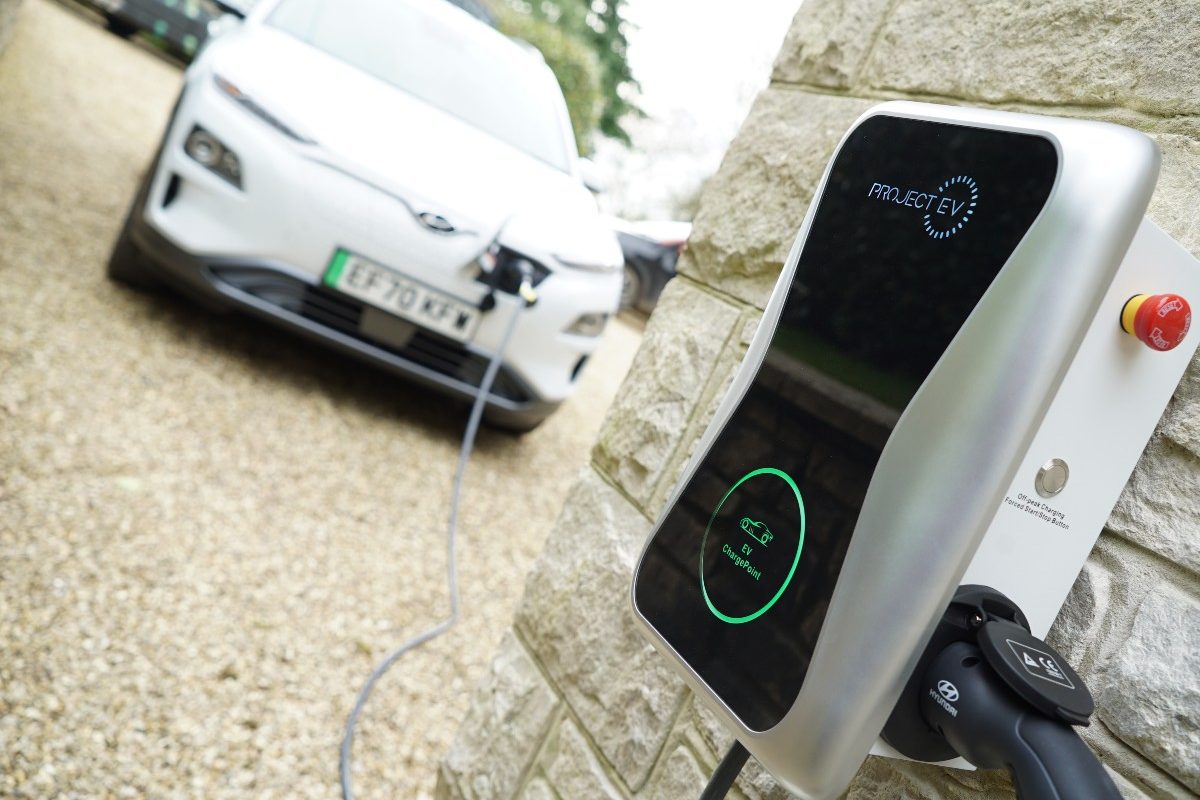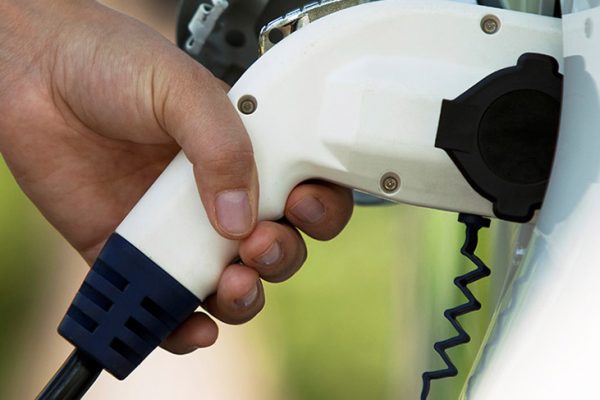As EVs become more popular, now’s the time to install a charger at the workplace or at home
HAVING driven all manner of exotic and high powered cars on road and track down the years, I’ve never been more terrified than I was when driving an electric car.
That was how I began to write a review of the first EV that came in on test. That was a few years ago and the reason for my fear was range anxiety. Capable of just 30-odd miles on a full charge and very little in the way of charging infrastructure, every journey was heart in mouth stuff.
Things have obviously moved on. The range of most EVs has increased dramatically while the charging infrastructure is building. Our two most recent test vehicles, a Hyundai Kona, supplied by car subscription service Onto and Audi UK’s latest e-Tron S Sportback, both cover in excess of 200 miles – in fact the Kona is closer to 300.
However, the fast chargers in both my nearest towns have been out of action for various reasons over the past few weeks – vandalism being perhaps the most worrying. With an increasing amount of EVs – cars and vans – coming to us for review, it was time to get a home charger.
Appointed Representative Opportunities with Wessex Fleet
Have you thought about growing your broker business? Are you looking for opportunities for growth? Then why not consider joining Wessex Fleet as an Appointed Representative?
Keeping you on the move with leasing solutions tailored to your needs
Leasys is the proud Contract Hire partner of the Stellantis brands, offering mobility solutions from medium and long-term rentals to management systems for company fleets.We work with Brokers to support all their customers requirements.
Accelerate your business with QV Systems & Leaselink
Unlock unparalleled efficiency in vehicle procurement with QV Systems’ Accelerate, now seamlessly integrated with Ebbon Automotive’s Leaselink. Tailored for brokers and funders, this integration streamlines the entire process from quote to delivery, empowering you to effortlessly source and order vehicles for your clients.
Who better to turn to, then, than Leasing Broker Federation partner Project EV?
It specialises in providing cutting-edge electric vehicle charging points, connecting customers and helping them make the switch to clean and affordable energy by adopting smart charging for electric vehicles.
It has a wide range of floor and wall-mounted AC and DC electric car chargers, and the technology provides high energy output needed to keep an EV charged and running well. Project EV’s electric vehicle charging points come with full electrical and temperature protection, compact design, smart apps, and they are all tested to European standards, with an OCPP v1.6 open chargepoint protocol.
I went for a wall mounted 7.3kW charger which the guys from Project EV took just a few hours to install. The charger was mounted outside the garage wall and involved drilling through into the garage where, handily, our main residual current device (RCD) is located.
A large part of the work then involves running and connecting the wiring. The charger itself is not obtrusively large and looks quite smart. Operation is simple enough, just plug and play.
There are some other neat features as well: features include:
- Five year warranty
- Cable lock system
- Dynamic load management
- Compatibility with solar installations
- Off-peak time shifting
- Free monitoring app
The app allows you to control charging, including setting off-peak preferences and timing, from your mobile phone. What is required is a good wi-fi signal at the premises which in our case it’s not! But fibre optic is on its way.
To become a domestic customer of Project EV, you can apply for grant funding from OLEV for a home charging station. The Electric Vehicle Homecharge Scheme (EVHS) provides grant funding of up to 75%, of £350, towards the cost of installing electric vehicle chargepoints at domestic properties across the UK.
The Workplace Charging Scheme (WCS) is a voucher-based scheme that provides support towards the up-front costs of the purchase and installation of electric vehicle charge-points, for eligible businesses, charities and public sector organisations.
Workplaces can apply for vouchers using the Workplace Charging Scheme application form.
Businesses who wish to install EV car chargers can also benefit thanks to a recent announcement from the government that states that employers will not be taxed on electric charging. You can also lease an EV through work without having to pay any Benefit In Kind taxes.
Making the switch to owning an electric vehicle is easier than ever before, with reasonably priced car manufacturers committing to producing affordable electric cars in 2021 and beyond. However, the idea of switching from petrol or diesel to electric charging can be quite daunting and can pose several questions to a new electric car owner.
Alongside the obvious benefits of being kinder to the planet, electric cars have increased in popularity due to longer range, tax reductions and exemptions from certain fees and charges. By calculating your EV charging costs, you’ll be able to see your running costs, and in turn, the money you are saving by switching to electric.
Calculating costs can take some time to wrap your head around, but once you know the type of car you’ll be purchasing and roughly how many miles you cover annually, you’ll be able to budget and prepare accordingly.
Know the size of your battery
The capacity of an electric vehicle’s battery is expressed in Kilowatt hours, which is a measure of the energy storage available in the cells. Battery sizes will vary widely depending on what type of electric car you choose. The larger the car doesn’t necessarily correlate to a larger battery, but in many instances this is the case. For example, the Renault Twizy has a very small 13kW (kilowatt) battery whereas a larger vehicle such as the Hyundai Kona has a huge 150kW battery.
You should be able to find the size of your electric car battery in the vehicle manual, or alternatively a quick Google search should return the result for you.
Discover your charging options
Knowing how to calculate your EV charging costs will depend on how you choose to charge your battery. There are several options available, and most likely you’ll use all of them at some point in your time of electric car ownership.
While owning a petrol or diesel vehicle tethers you to the price of fuel, electric car charging costs can fluctuate depending on which way you choose to charge up. There are several charging options available, including home charging, rapid charging, and station charging. Don’t forget to factor in your electric vehicle’s range too as this will impact how much you’ll need to charge, and subsequently your EV charging costs.
Charging at home
To calculate your electric car charging costs if you were to charge at home, first find out how much you pay for electricity in your household.
In terms of domestic electricity, there are currently three tariffs available to the public.
24 Hour – Your cost per kWh is fixed, regardless of the time of day
Daytime – There is a set rate for daily use, this will vary depending on your supplier
Night time – usually a cheaper tariff due to less demand on the National Grid, but hours vary based on your supplier
To give you an idea of how this compares to general household energy use, the average UK home is classed as a medium energy consumer at around 3,100 kwH annually., You’ll pay between 14-16p per KWh, depending on who your electricity provider is.
So to calculate your electric car charging costs from here, you need to apply a simple formula:
Size of battery (kWh) x Electricity cost of your supplier (pence per kilowatt hour) = Cost to charge an electric car from absolutely empty to full
Using the electric car examples mentioned above, and taking 15p as an average cost, calculating your EV charging costs would be as follows:
Renault Twizy 13kW x 0.15p = £1.95
Hyundai Kona 150kW x 0.15p = £22.50
Home charging is by far the most convenient and cost-effective charging choice.
Public charging stations
There are currently nearly 33,000 public charging stations across the UK. Charging locations are often privately owned, so charging costs will vary from station to station. This can make calculating your EV charging costs difficult, as there is no set tariff from one station to another.
Some networks require a charging card (similar to a debit card) while others will require you to download an app. You may encounter monthly subscriptions and many will require you to create an account, but conveniently, as electric car ownership increases so will pay-as-you-go card readers which are much less hassle.
You might also find that some charge points are free to use in shopping centres or attractions such as theme parks, but it’s best not to rely on this option as they are not always readily available.
Rapid charging
At times, you may need to use fast charging. This is a great way to top-up your charge on a long motorway journey, or if you’re in a rush! This is a quick, but expensive way to charge your electric vehicle. Fast charging stations are often found at motorway service stations and the tariff can vary depending on the operator.
Charging an electric vehicle at a rapid charging station will be completed in less than an hour, but can cost upwards of £12 for a standard size electric car. This isn’t the most cost-effective way to run your EV, but you may need to use this when undertaking long journeys.
If installing a home charger is on your radar for 2021, or you run a business and are considering installing charging points for your employees, Project EV can assist you with any questions you have.
Get in touch with Project EV here.


























